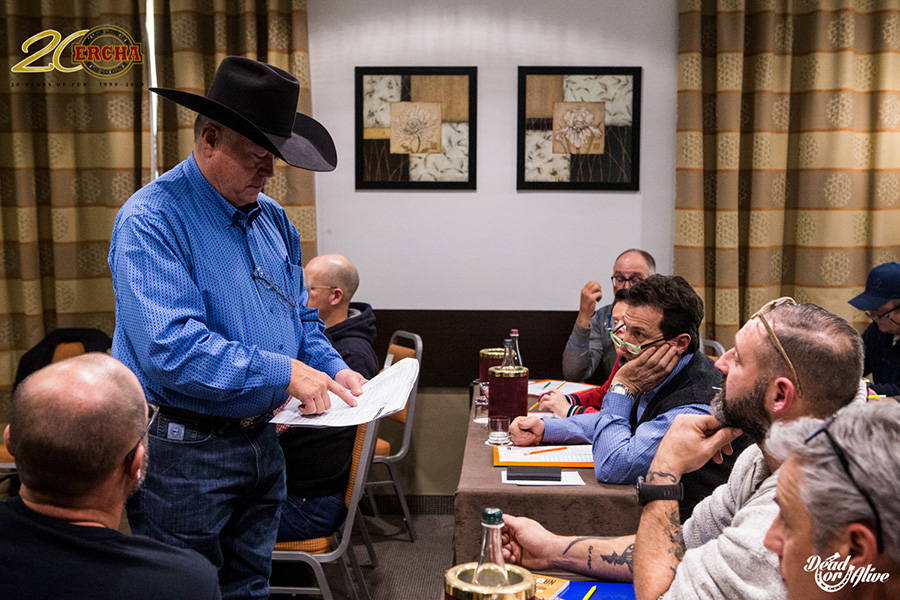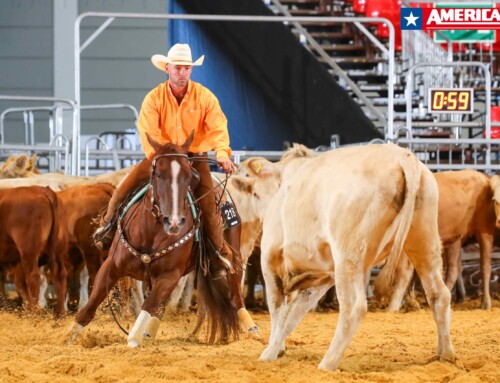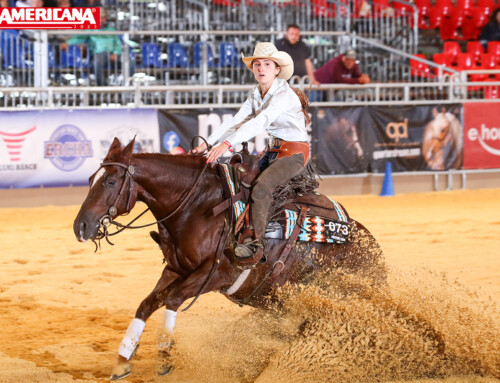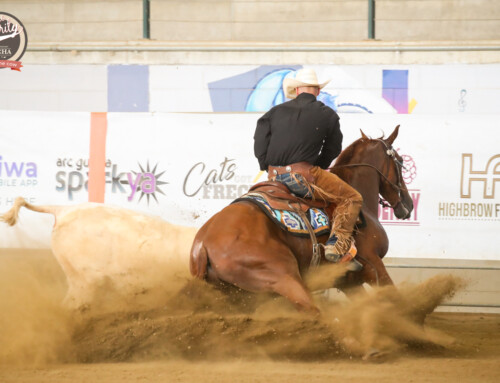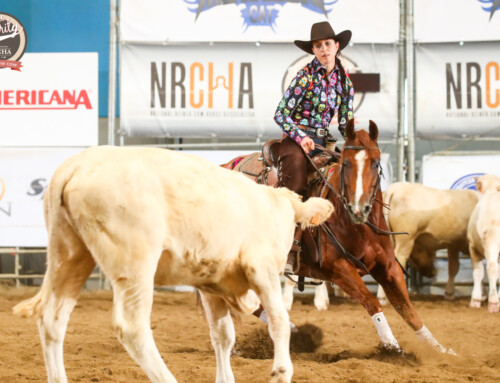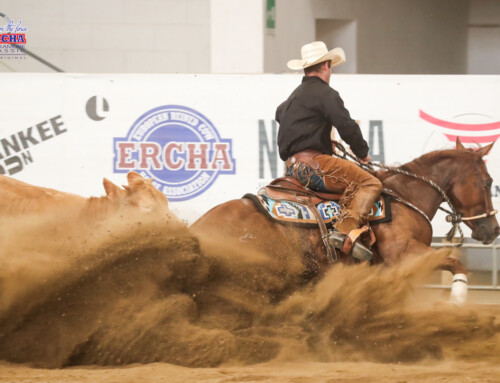
Chris BenedictUSA CLINICIAN-MENTOR
Every two years the NRCHA requires judges to be re-certified, or new judges to take the test, wherever they do the seminar. This clinic here is for the whole of Europe, there are attendants here from different countries: 50 people attending the course, 9 are testing. The first day, it was really good. We started with the cow work, and attendants asked a lot of good questions, actually. And this is exciting to see! They are really interested and pay attention to the details! I think it is a really nice group of people here. We did the reining on the second day, and it was really smooth, and we fixed to do the herd work in the last part of the course. People here are really excited about it! As a judge, I believe the fence work its is probably the hardest part of the whole deal. At the Nrcha Futurity, or Derby or in any main aged event, it all comes down to the fence work. The herd work, it’s pretty self-explanatory, it is more controlled, the rein work as well is obviously more controlled, but the fence work: it is a completely different deal! It Is just you, your horse, and the cow. And if you draw a bad cow, that’s going to go fast, or a slow cow, that is not fast enough to show your horse, and it happens so fast, that you hardly have time to judge: this is what makes it difficult. And in the good fence work runs, it all happens in about 40 seconds, or even less! So, very seldom you have time to think, You have to be there: it is the thoughest part to show, and to judge also. If you don’t know the rules, you are really in trouble, not only from the judges point, but also from the riders’ point. If they know what the rules are, and know what the penalties are, to avoid having the penalties, and if they know what the credits are, to where you can get credit. It really makes a lot better for the judges, if the exhibitors know what they are doing, and what the penalties one. You don’t have time to think: if you have time, you probably make not score very good! The better you know the rules, the better you are showing.

Eugenio LatorreITALY NRCHA AND NRHA JUDGE
The seminar was extremely interesting this time, much more than in the past I believe. We had the chance to clarify some really important issues, especially considering the cow work. We started with the boxing classes and carried on to the fence work classes: we have analyzed and clarified some points that were not so simple and plain in the past. There was some confusion about some situations, such as the new penalty introduced with the circling turn: before now, also in the past show season, there were different attitudes toward this kind of maneuver: some judges applied the 5 point penalty as they did not consider it as a turn, while some others just judged the quality of the maneuvre without applying the penalty. Actually, this point was not even clear to the Nrcha Judges Committee itself, as it as never been discussed and clarified before. Now we finally have the instruments to recognize and apply the penalty correctly. I took some notes for myself, and I found it very interesting the fact of calculating an average score for the turns, instead of judging each single turn on its own. I believe this is very important. It is a better instrument to give the correct score to a rider. We could better fill in the score card and better explain to the riders which was the level of their run, in every section. Moreover, we are happy that Chris is a specialist in cutting, and he will surely clarify even better the herd work section, which is actually very important in a Cow Horse Show!

Jan BoogaertsBELGIUM NRCHA AND NRHA JUDGE
I think this school is very good for several reasons: the clinician, Chris Benedict, he has a way of explaining things, probably a little bit different from the clinicians we had in the past, but he put everything in perspective, everything in focus: He gives you a different way of thinking about things, but to come to the same end. I think that seminars like this are extremely important, just to get everybody on the same page. The NRCHA Schools and ERCHA Schools are always held in a very good atmosphere, there’s a lot of acknowledged people, here, just sitting in the classroom: there are no stupid questions, there are not conversations that are not up to the point. This school is absolutely great:all the Ercha schools held here in the past years were great, and there is a bonding between the judges, because we can share experiences, tell stories, and this just brings the European Judges score together, all on the same page. This is going to make our job easier, more evaluable, and much more fun. The number of people attending the class is awesome: it is almost unbelievable for a relatively small sport in Europe, almost 50 people here, it is really amazing. And what I do really think that it is also very important that ERCHA team make sure that anybody that wants to come, and sit in, and learn, is really welcome to do it! That is extremely important because in a lot of other disciplines we see a lot of people that think or have their own interpretation of the rules, but have no clue of what judges are trying to look for. While here, riders and all people who are willing to learn more, are welcome to come here, and they came in big numbers, even if they had no intention to become judges, but they want to learn more about this sport, and make sure, no matter what they are training for, that it is the right thing. It is extremely important to make a sport, an industry grow, anywhere in the world. Cow horse is definitely destined to grow in Europe, and ERCHA is making it easy for people to come, by creating a nice event, and prize award together with the course, so many people are going to be here anyway! This is great indeed!’.

Maik BartmannGERMANY NRCHA AND NRHA JUDGE
First of all I should say this was a great course, again: it is always very interesting for me to see they have new clinicians coming over, and getting different point of view from someone else. I have to say that Chris Benedict did a fantastic job. I think he is an awesome teacher, with a lot of knowledge that he shared with us. For me, specifically, it was interesting to hear about the clarification on the 2 points penalty rule that is now on the circling turn – if you have a fence work run with just two fence turns – and he gave some very clear explanations and examples on that. Moreover, it is always great to refresh your mind, and get up to date for our perspectives, as a showman, and a judge: both ways! There were lot of people to listen to the seminar: the group is getting bigger and bigger every time we do this kind of event. I remember that the first time we did this courses there were hardly 20 people in the room, and now it is packed with very motivated and enthusiastic people, coming from all over Europe, and some of them don’t even want to become judges but they want to become better showmen and learn more about how these events are judged. I think it is an extremely good outcome that we have to see this thing growing so much. There are always a lot of questions, and by the way these people ask you can tell that they have done this before, and they are anxious to learn more. They are experts, already, and they just want to become even better. Personally, I think that the hardest part of the judging system, is that you have to be quick on penalties’ application, especially in the cow work, because things can happen very fast, and you have to be able to know the penalties and tell your scribe to put them in the correct place, or doing it yourself, and don’t forget any because as I said things can happen very quickly. For me, what I figure is probably the hardest thing and I don’t’ say that it’s impossible, but I would not want to be judging the reined cow horse if I wouldn’t show it myself. Because I think you only have a good feeling about cattle, about horses, and can evaluate certain situations much better if you do that sport yourself, if you know both perspectives, like from the outside, and out of the saddle as well.

Styrbjörn PerssonSWEDEN NRCHA JUDGE
The Judge Seminar was very well organized, and I told to my customers and to all my friends in Sweden to come to the Seminar to try to learn how to show a little bit better. Unfortunately none of us did the exam to get the judge card, we were only auditors. I tried to convince one of our girls that was really good in the practice, to try the exam, but in the end she did not try. Anyway, I was happy there were many of us and following the seminar was very useful and interesting. The sport of cow horse is much better now in Sweden, and it is developing quite a lot. Ercha helped us so much in this sense, providing good judges, and helping us with the shows. Last season we managed to have 4 Ercha Sweden Shows, and we will try again this year to have reach again the same number
We are planning that, and not defined all details yet, so we could not say anything precise at the meeting, at the moment. I hope within the near future we’ll have more information about that.
We are planning that, and not defined all details yet, so we could not say anything precise at the meeting, at the moment. I hope within the near future we’ll have more information about that.

Tomas BartaCZECH REPUBLIC ATTENDANT FOR JUDGE CARD
I really enjoyed this course and the clinician Chris Benedict, because he has a different teaching system, compared to the one we saw few years ago. This new teaching system fits for me definitely, because I understand it better. Details were much more clear to me, as a rider and trainer as well. For my country, this is very good because now that I understood things better, I could explain them to my riders and friends at home, also. I also tried to do the judge test, this time! I think it is quite difficult for anybody, because not only you have to know all the rules, but also we need to have some experience with cow horses, shows, competitions. If you don’t show cow horses yourself, it is very difficult not only to understand the rules but also to apply them: if you don’t show cow horses, it is very hard to judge this kind of competitions. To me, the most difficult part to judge is the cow work, because everything goes very fast, and you have to tell the points, the penalties, and write your notes on the score card, thinking…all together in few seconds when the run is happening. That is though!! I am also happy to have attended this course and test because I am sure that it will help me to become a better showman, and improve my performance. If you know what judges want to see, you can better show your horses! I believe that also my Non Pro riders should watch such a course, and try to learn and understand a little bit more!

Rick Le MayUSA NRCHA AND NRHA JUDGE
As a judge, I think that it is very important that we have continuing education and keep refreshing ourselves about the rules and the update and changes in showing styles and techniques. This seminar, I was complimenting earlier, is very very well organized, we have an excellent instructor here, for the people to work with, and I have been doing this for many years now, so the quality of the information we get at these seminars are improved sensibly and continuously, over the years. Chris used a different teaching system, to explain the changes they made in the score cards, and some minor changes in the teaching protocol, but these are updates that they are experimenting. Considering the three runs of a cow horse show, the reining section is really easy for me because of the long NRHA experience, but the Fence work is normally the most difficult part, as it happens so quickly, and you have so many things to keep track of. It is so fast, whatever things that happens, and you have such small things that separate really good runs from the average runs. The huge number of attendants that we had here is tremendous! I was totally surprised to see fifty people here! This shows the size of the growth of the sport, of the shows, all over Europe! The numbers are growing really quickly, and it is almost totally new people that are coming to the cow horse! It is a complete new market for people and they really love working with the cows! Personally, I have travelled a lot, worked in Scandinavia, Belgium, Italy and now I am in Spain, and the western riding is developing so much there also. I have made some clinics, and I could say they have a tremendous horse background there, good young riders, they are such nice horsemen, the Spanish people!

Jean Luc ReanudFRANCE AUDITOR
I think that this course is extremely interesting and useful for all riders, but especially for a Non Pro rider as I am. I came as an auditor in order to better understand the rules, to get to know what judges are looking for, and therefore improve my riding, and my show performances. I need to understand how judges evaluate certain actions, and how they apply the penalties, to become a better showman. I wanted to study and better understand all the rulebook and be well aware of what I should do when I am showing a cow horse. This was my first judge seminar, but I really enjoyed how NRCHA judge Chris Benedict explained the rules: I understood much more details, he was very clear in the explanations, and I learned a lot of things that I actually did not know at all! The most interesting thing was the penalties application and clarification: when they happen, when they are applied. It is important to know when you risk to incur in penalties, in order to try to avoid them and stay safe and clean in your run. If you do not know the rules and the penalties, it is much easier to make mistakes and lose points on a run. Moreover, there is always such a warm, friendly and nice atmosphere here in Italy, at the ERCHA events. We are always welcome, we are always helped by the organization with documents, payments, everything is perfectly organized in every detail. In particular, I wan to thank Otto that is always so helpful and friendly! We feel like at home!

